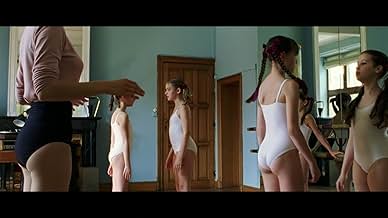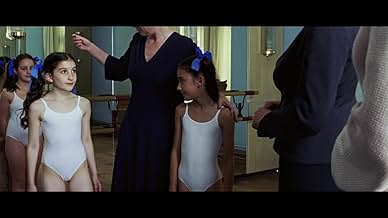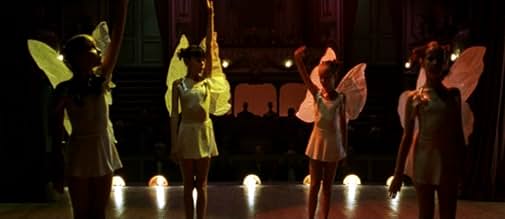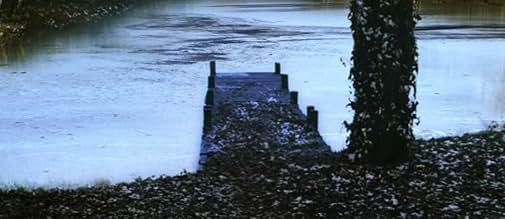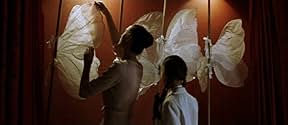Innocence
- 2004
- Tous publics
- 2h 2min
NOTE IMDb
6,8/10
6,7 k
MA NOTE
Un regard à l'intérieur d'un internat décalé pour jeunes filles.Un regard à l'intérieur d'un internat décalé pour jeunes filles.Un regard à l'intérieur d'un internat décalé pour jeunes filles.
- Réalisation
- Scénario
- Casting principal
- Récompenses
- 8 victoires et 2 nominations au total
Avis à la une
The final title, "for Gaspar" (Noe, director of IRREVERSIBLE), hints at the pedigree of the makers of this quite fascinating study of young girls on the cusp of adolescence.
Benoit Debie, the cinematographer of IRREVERSIBLE, shot the film.
Six year old Iris (Zoe Auclair) arrives at her new country school in a coffin. She becomes infatuated with twelve-year-old Bianca (Berangare Haubruge) who disappears each evening and returns in the morning. The girls spend most of their days studying ballet and preparing for an important exam.
The school is like a keep. The girls are encouraged to find happiness in obedience. Parents never visit. The world beyond its tall hedges exists like something within a dream.
Director Lucile Hadzihalilovic imbues every aspect of the film with a dreamy, meditative veneer. Shots of the pre-teen nymphs dancing, cartwheeling and splashing about in shallow water recall the grainy erotic imagery of David Hamilton's early feature films -- in particular, LAURA and BILITIS. The ballet sequences and striking compositions of solitary female figures in towering external landscapes owe a small debt to Dario Argento's SUSPIRIA and, to a lesser extent, his PHENOMENA. But this is not a deliberate softcore meditation on childhood sexuality. It is a metaphorical examination of how innocence is ruptured by its own curiosity.
The camera angles stress the importance and prominence of legs to a fetishistic degree. This focus is an organic extension of the girls' ballet training; a darker purpose for legs is indicated later in a chilling line of dialogue. Debie's cinematography emphasizes light and shade and is never pretty for its own sake.
The forest filled with lamps has a deliciously surreal, fairytale quality. The sequences where the girls dance for a faceless audience reminded me of one of MULHOLLAND DRIVE's most haunting sequences. The film's sound design also echoes the internal voids of the Lynchian world.
The film is not big on explanations and is a touch too slow at times, but it presents a thoroughly realized universe that is a stark metaphor for life's discoveries and disappointments. The performances possess perfect pitch and the tone remains both haunting and consistent.
What exactly is the film about? The girls may be in a purgatory of sorts, a resting place between life and death. Perhaps not. Perhaps they are in a holding pattern between childhood (innocence) and adulthood (a state requiring some loss of innocence), and when they manage to escape (succumbing to their pre-adolescent curiosity), they have forfeited their place in childhood forever. But only perhaps.
Benoit Debie, the cinematographer of IRREVERSIBLE, shot the film.
Six year old Iris (Zoe Auclair) arrives at her new country school in a coffin. She becomes infatuated with twelve-year-old Bianca (Berangare Haubruge) who disappears each evening and returns in the morning. The girls spend most of their days studying ballet and preparing for an important exam.
The school is like a keep. The girls are encouraged to find happiness in obedience. Parents never visit. The world beyond its tall hedges exists like something within a dream.
Director Lucile Hadzihalilovic imbues every aspect of the film with a dreamy, meditative veneer. Shots of the pre-teen nymphs dancing, cartwheeling and splashing about in shallow water recall the grainy erotic imagery of David Hamilton's early feature films -- in particular, LAURA and BILITIS. The ballet sequences and striking compositions of solitary female figures in towering external landscapes owe a small debt to Dario Argento's SUSPIRIA and, to a lesser extent, his PHENOMENA. But this is not a deliberate softcore meditation on childhood sexuality. It is a metaphorical examination of how innocence is ruptured by its own curiosity.
The camera angles stress the importance and prominence of legs to a fetishistic degree. This focus is an organic extension of the girls' ballet training; a darker purpose for legs is indicated later in a chilling line of dialogue. Debie's cinematography emphasizes light and shade and is never pretty for its own sake.
The forest filled with lamps has a deliciously surreal, fairytale quality. The sequences where the girls dance for a faceless audience reminded me of one of MULHOLLAND DRIVE's most haunting sequences. The film's sound design also echoes the internal voids of the Lynchian world.
The film is not big on explanations and is a touch too slow at times, but it presents a thoroughly realized universe that is a stark metaphor for life's discoveries and disappointments. The performances possess perfect pitch and the tone remains both haunting and consistent.
What exactly is the film about? The girls may be in a purgatory of sorts, a resting place between life and death. Perhaps not. Perhaps they are in a holding pattern between childhood (innocence) and adulthood (a state requiring some loss of innocence), and when they manage to escape (succumbing to their pre-adolescent curiosity), they have forfeited their place in childhood forever. But only perhaps.
I walked out of this film being the only one of a group of 5 with any clasp of what it was about. That in itself may say something about my own innocence. Many reviews of this film seem to shout 'Paedophiles!' at the reader, to me this is an interesting reaction to a film, with near fairy tale qualities, which explores themes of innocence,childhood and how our own curiosity can destroy these. Every theme in this seemingly idyllic (and beautifully captured) girls school will represent a reason for one viewers loss of innocence, and when the film drags in places I do wonder if this intentionally mirrors a child's own impatience to 'grow up'. Perhaps it is the viewers lack of innocence that adds to the films underlying eeriness..........or perhaps its that rumbling noise?
Reading a lot of the interesting comments people have made about this film, it's obvious most didn't understand it.I admit this includes me. I enjoy an original idea for a movie, one that makes you think, but if it is too obscure surely that defeats the object? A lot of the comments mention paedophiles, an overused word that's fashionable at the moment.I'm a bloke but ye Gods, these were tiny little girls and not sexual. Someone mentioned the bathing and said they were uncomfortable with it. Nobody was nude! If a scene such as this makes a person less than happy, I suggest it says a lot about that person's mind. David Hamilton's 'Bilitis' has a scene where a group of schoolgirls strip off and go gamboling in the sea, that is certainly done, (in my view) to titillate. Innocence isn't at all like that. Europeans such as the French and Germans have, it seems to me, a lot healthier attitude to sex than either the Brits' or the US who tend to look for an ulterior motive in anything. Having said that- There is an interview with director Lucile Hadzihalilovic on the DVD, in it she mentions words to describe the movie, such as paradise, prison, nature, appealing and interesting.She says the film is essentially sensual and a claustrophobic universe. Also says that there is no violence and nothing offensive in it. It interested me to hear her say that women would identify with it easier than men, as their own view of young girls will be evoked. For some that may be problematic, for others, not at all. Read in that what you will chaps. There are few sights more pleasurable than a happy female, (of any age.) I remember an old saying, - 'Little girls, like butterflies, need no excuse.'
If you've ever read the work of German symbolist writer Frank Wedekind then you may already have an idea about how difficult a text first feature writer-director Lucile Hadzihalilovic chose to adapt and execute. But execute she does for a good portion of the film until the rather obvious over-the-top conclusion that fails to answer many of the questions raised earlier.
That said, there is much to enjoy this film mainly due to its excellent cinemascope photography and the whole idea of an idyllic place where prepubescent girls are trained to be ballet dancers in order to enter the world as proper teenage women.
Since this is a symbolist writing, one can also entertain thoughts of purgatory (the characters are brought into being via a coffin), isolated same-sex societies (with one old man that is never explained), or some of the themes M. Night Shymalan explored in "The Village" with fear being used to keep a small population under control.
In any case, this film will provoke much discussion afterwards so bring your most knowledgeable cinema pals and dig in. Young girls in white outfits giggling and playing for two hours may not be everyone's simplification of the world at large, but in some ways it does sum up the dangers of segregated societies.
Not bad for a first film with extremely difficult material. A remarkable debut nonetheless.
That said, there is much to enjoy this film mainly due to its excellent cinemascope photography and the whole idea of an idyllic place where prepubescent girls are trained to be ballet dancers in order to enter the world as proper teenage women.
Since this is a symbolist writing, one can also entertain thoughts of purgatory (the characters are brought into being via a coffin), isolated same-sex societies (with one old man that is never explained), or some of the themes M. Night Shymalan explored in "The Village" with fear being used to keep a small population under control.
In any case, this film will provoke much discussion afterwards so bring your most knowledgeable cinema pals and dig in. Young girls in white outfits giggling and playing for two hours may not be everyone's simplification of the world at large, but in some ways it does sum up the dangers of segregated societies.
Not bad for a first film with extremely difficult material. A remarkable debut nonetheless.
Innocence is a unique film that defies typical description and ignores filmmaking conventions. If you like films that confuse and surprise, you just might love this. If you need something loud, viscerally exhilarating or explicit, look elsewhere. Innocence is a film that plays with our preconceived notions about underage female sexuality. If you enjoy Suspiria of (the real) Alice in Wonderland this little-seen French gem comes highly recommended. However, this film does not glorify in cute girls dancing or wandering through fantastical dreamworlds. Yes, it is dreamlike and mystifying, but this is not Dario Argento.
Innocence approaches Picnic at Hanging Rock's dreamlike quality. What it manages to achieve is presenting what is both natural but unfamiliar through the eyes the young girls experiencing it. Innocence film is very dreamlike and doesn't rest on one main character's perspective.
Innocence is both haunting and sweet. This is a film about the loss of innocence in young girls, but it toys with our notions of innocence, sexuality and objectification. In short, what does being a woman today mean? You won't be satisfied though one viewing of this film. If watching something once only makes you want to see it again, it must be worth it.
Seek this out. Pass over the latest trending rental and add this to your Netflix queue.
Innocence approaches Picnic at Hanging Rock's dreamlike quality. What it manages to achieve is presenting what is both natural but unfamiliar through the eyes the young girls experiencing it. Innocence film is very dreamlike and doesn't rest on one main character's perspective.
Innocence is both haunting and sweet. This is a film about the loss of innocence in young girls, but it toys with our notions of innocence, sexuality and objectification. In short, what does being a woman today mean? You won't be satisfied though one viewing of this film. If watching something once only makes you want to see it again, it must be worth it.
Seek this out. Pass over the latest trending rental and add this to your Netflix queue.
Le saviez-vous
- AnecdotesIn the 'extras' on the DVD release, the director relates that children playing unsupervised in nature (the forest, the pond) is a 'freeing' setting for them, an 'uncontrolled' environment to explore. Water is very important, as it is a highly visible medium in its many forms (including within or from underneath a surface), and it is necessary, sensual, and enjoyable, but also dangerous (the drowning), and evokes many emotions. Flowing water can also symbolize the passage of time. The dynamic of children relating to adults, not understating them or their actions, while seeing them as role models, is another dichotomy the director wanted to emphasize. Ambiguity and a 'dream-like' quality are also important elements of the film. She states they digitally enhanced or 'tweaked' colors in the film to 'non-realistic' tones, to achieve mood and lighting effect, particularly day for night shots. The director says she is not interested in explaining meaning: "... what I like in cinema is being lost. I like films I don't completely understand, so they stay with me longer after they're over," and, "I believe everyone can find their own stories within the film."
- GaffesWhen Bianca says goodbye to all the girls there is snow in the alley and they are all outside dressed with bare arms and bare legs. Then Bianca runs away in pouring rain. No more snow on the ground.
- Crédits fousThe entire set of credits is shown at the opening of the movie.
- ConnexionsFeatured in Women Make Film: A New Road Movie Through Cinema (2018)
- Bandes originalesOrchestral Suite from La Petite Renard Rusée
Composed by Leos Janácek
Libretto by Rudolf Tesnohlídek
Performed by Czech Philharmonic (as The Czech Philharmonic)
Conducted by Vaclav Talich
Meilleurs choix
Connectez-vous pour évaluer et suivre la liste de favoris afin de recevoir des recommandations personnalisées
- How long is Innocence?Alimenté par Alexa
Détails
- Date de sortie
- Pays d’origine
- Langue
- Aussi connu sous le nom de
- L'école
- Lieux de tournage
- Parc du Cinquantenaire, Bruxelles, Belgique(walking to new school)
- Sociétés de production
- Voir plus de crédits d'entreprise sur IMDbPro
- Durée2 heures 2 minutes
- Couleur
- Mixage
- Rapport de forme
- 2.35 : 1
Contribuer à cette page
Suggérer une modification ou ajouter du contenu manquant



